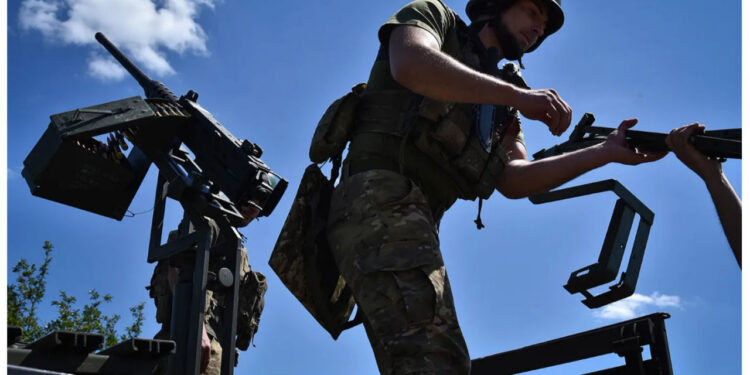Five Ukrainian members of parliament visited Washington this week to engage in discussions with officials from the Biden administration and lawmakers in Congress. Their objective was to urge the United States to reconsider the ban.
“It’s absolutely mind-boggling. Military personnel, including generals, just don’t seem to grasp the situation. They keep pressuring us politicians to halt this policy, claiming it’s completely insane.”
During his visit to Kyiv this week, Secretary of State Antony Blinken reaffirmed the United States’ commitment to supporting Ukraine in its conflict with Russia. He emphasized that while the U.S. is dedicated to helping Ukraine secure victory, it is crucial for Kyiv to prioritize the task of reclaiming Ukrainian territory.
During a press conference, Blinken emphasized the importance of Ukraine taking the lead in making decisions regarding its conduct in the ongoing war. He acknowledged that Ukraine is fighting to defend its freedom, sovereignty, and territorial integrity. Blinken further reiterated the United States’ clear stance on its own policy in relation to the conflict.
Ukraine is actively lobbying for the U.S. to lift the ban, in light of Russia’s advancements in the northeastern Kharkiv region and its increasing pressure on Ukrainian forces along the 600-mile eastern front.
Senator Mark Kelly, a member of the Senate Armed Services Committee, highlighted the challenges faced by Kyiv due to the prolonged delay in the passage of a national security supplemental. This crucial legislation, which includes $61 billion to support Ukraine, was held back by the United States for several months.
In an interview with The Hill, he emphasized the importance of balancing the provision of weapons with the need to prevent the conflict in Ukraine from escalating further.
Kelly emphasized the importance of Ukraine’s efforts to find solutions to counter the Russian momentum. According to her, Ukraine is rightfully exploring different options to reverse the situation.
Ukraine has consistently maintained that its capability to target legitimate military objectives in Russia is crucial for its self-defense.
Ukraine has taken a different approach instead of implementing a policy change. They have decided to retaliate against Russia by utilizing their own weaponry, particularly inexpensive drones, which have been causing disruption to Russian targets, including oil refineries. This campaign of drone attacks on oil refineries has been intensifying and expanding in recent months.
According to Maksym Skrypchenko, the president of the Ukrainian think tank Transatlantic Dialogue Center, Russia has relocated its command centers within its own borders, effectively placing them out of range of HIMARS.
“If the ban had been lifted before the Kharkiv offensive,” Skrypchenko noted, “it could have potentially hindered Russia from accumulating troops at the border.”
Ukrainian lawmaker Oleksandra Ustinova, who serves as the deputy head of the parliamentary group on relations with the U.S., has raised concerns about the potential fate of Kharkiv. Ustinova fears that the city could suffer a similar fate as Mariupol, which was devastated during the early stages of the conflict.
During a roundtable discussion in Washington this week, she emphasized the critical importance of obtaining permission to deploy Russian weapons along the border. She expressed concern that without this authorization, there is a significant risk of losing major cities and the entire region. She highlighted that Russia is aware of this restriction, making it imperative to address the situation promptly.
The recent analysis by the Institute for the Study of War (ISW) highlights the flaws in the U.S. policy towards Ukraine, stating that it “makes no sense” and significantly undermines Ukraine’s defense capabilities against the Kharkiv offensive.
According to George Barros, the Russia team and geospatial intelligence lead for the Russia-Ukraine war at the ISW, the U.S. policy is hindering Ukraine’s ability to counter the threat posed by precision-guided glide bombs. Ukrainian forces have been facing difficulties in effectively neutralizing these bombs.
Western allies of Ukraine have always been concerned about the escalation of the conflict between Ukraine and Russia, especially considering Russian President Vladimir Putin’s frequent threats to use nuclear weapons.
He suggested that instead of drawing our own red lines and informing Russia about them, it is time to put an end to this approach. He emphasized that the war in Ukraine is not merely a conflict where parties aim to achieve strategic objectives on each other’s territory, but rather an existential battle for the survival of the Ukrainian people.
During a visit to Kyiv earlier this month, U.K. Foreign Secretary David Cameron made it clear that London would not hinder Ukraine from utilizing British weapons to launch attacks within Russian territory.
During an interview with Reuters, Cameron expressed his belief that Ukraine has the right to assert its sovereignty.
“We firmly believe that the equipment and capabilities provided to Ukraine, by us and other countries, should be utilized to reclaim Ukrainian sovereign territory,” she stated. “The weaponry provided is intended for use on the battlefield.”
According to John Herbst, a former ambassador to Ukraine and senior director of the Atlantic Council’s Eurasia Center, the United States is contradicting its own goal of preventing Russia from winning the war with its current policy.
“He stated that this goes against the geopolitical interests of the United States, and from a humanitarian perspective, it is completely unacceptable.”
“We have crossed many alleged Kremlin red lines without witnessing any catastrophic consequences. Moreover, the British have given the Ukrainians permission to use their weapons wherever they see fit. This means that the red line has already been partially crossed.”
Sen. Rick Scott (R-Fla.), a member of the Senate Armed Services Committee, expressed his belief that utilizing the weapons would be crucial in securing victory during the war.
Senator Tammy Duckworth, a Democrat from Illinois, expressed her concerns regarding the type of weapons Ukraine intends to use and how they will be utilized. She emphasized the need for assurances regarding the previous use of U.S. arms, such as cluster munitions.
She emphasized that at this moment, it is essential to maintain the existing restrictions.










